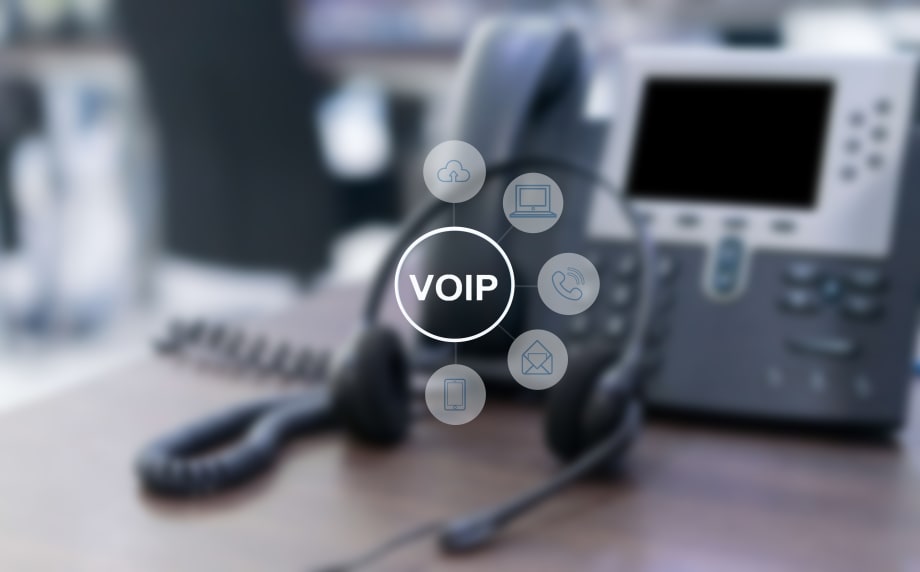What Office Phone Systems Are and Which One You Should Choose
We live in a world where communication is key. Today, every business needs a reliable way to connect with its customers, and that way is most often office phone systems. While there are other channels to reach your customers, like social media, email or live chat, the phone systems for offices are most widely used and account for most part of communications.
Part of business telecoms, office phone systems are a reliable and cost-effective way to help you connect with customers easier and facilitate inter-team communications. But what types of phone systems for offices are available and which one is the best for your business? Let’s find out!

Office phone systems explained
Office phone systems have undergone many changes in the last few years. Nowadays, they can be either hardwired or software-based. They allow business communications using internet protocol and traditional phone lines.
There are modern office phone systems like VoIP you can use to make and take calls over the internet, keeping the same old feeling of phone lines for your customers but getting all the modern advantages. We’ll get to these later on in our guide.
But first let’s talk about what types of office phone systems are available on the market.
Types of office phone systems
There are four major types of office phone systems, each with its particular benefits.
1. Public Switched Telephone Network (PSTN)
The Public Switched Telephone Network, or PSTN, have been around for a very long time, since the late 1870s. If you’re thinking landlines, you guessed correctly.
Landlines, as they’re commonly known, use underground wires to connect phone calls. You need to install phone lines across your entire office to use PSTN. Keep in mind that PSTN is analogue.
PSTN systems are widely used worldwide and for a good amount of time, they kept businesses and customers connected. But traditional landlines have not been the popular choice for a long time and will soon become completely obsolete.
2. Integrated Services Digital Network (ISDN)
The Integrated Services Digital Network is digital in nature and was formally standardised in 1988. Based on the circuits of the traditional PSTN, ISDN uses digital transmission to make both phone and video calls, transmit data and perform other network services. That means that ISDN can transmit both data and voice.
ISDN can run between 10 and 30 line connections at a time and it’s mainly used for big companies. ISDN systems can provide better speed and quality than traditional systems.
ISDN is still highly used in areas where broadband is not available. However, doomsday for ISDN connections is quickly approaching with the ISDN switch off in 2025.
3. PBX phone systems
Private Branch Exchange (PBX) systems were designed specifically for businesses. A PBX system is a private telephone network, meaning an internal phone system that uses fewer phone lines. It allows your employees to share a number of external phone lines.
PBX office phone systems include a telephone set connected to the PBX. This type of office phone system provides certain useful features like call transfer, hold, and conference calls.
With new terms like IP, VoIP, and hosted becoming more and more popular, it’s fair to say PBX will soon become obsolete.
4. VoIP office phone systems
You may have heard about Voice over Internet Protocol (VoIP) and you may be wondering what VoIP is. It’s all in the name, really. A VoIP phone system means you’ll make and receive calls over the internet, rather than using the traditional copper wire telephone system. VoIP is the truly modern phone system for your business.
Using VoIP as office phone systems means you’ll get rid of any hardware or special office equipment. All you need for your business communications over a VoIP system is an internet connection and a device like a smartphone, laptop, or desktop computer.
VoIP systems include all the useful features of other phone systems for offices. You have call management and monitoring, call forwarding, voice to mail, you can even customise your voicemail. You can record phone calls and monitor them in real time.
iCompario tip:
VoIP offers the best benefits compared to all other phone systems for offices. And with the ISDN switch off approaching fast, you should start moving to VoIP office phone systems sooner rather than later.
Features to pay attention to when comparing office phone systems
There are certain features that can be really useful to any business and that your office phone system should include.
- Transferring calls. This is a must-have option for any business today. No matter if you’re a school, a government agency, or your business operates in the health or hospitality industries, you must be able to transfer calls to the relevant colleagues quickly and at the touch of a button.
- Recording phone calls. Call recording is necessary for a number of business purposes, like improving employees’ performance, tracking progress, improving your services, or even avoiding unnecessary problems. No matter the purpose, your office phone system should be able to record calls.
- Call queuing. If your business takes more calls than your employees can handle, a call queue can be very useful. Callers will be placed in a queue and you can record an automated message to keep them on the line.
- Conference calls. There may be times when multiple members of a team need to be on a call. This is where call conferencing comes in hand. Your employees can attend a call from anywhere in the world, they don’t need to be in the office with the rest of the team.
Why VoIP is the better choice of all office phone systems

Of all phone systems for offices, you should choose VoIP if you want to future-proof your business. In 2025, phone lines will be removed and you’ll be forced to move to the cloud. You should already start switching to VoIP to make the transition smoother.
Types of VoIP office phone systems
There are two types of VoIP office phone systems that we’ve detailed below:
1. VoIP PBX
The VoIP PBX is a hybrid phone system. It uses a mix of traditional PBX phones and a cloud-hosted system. It’s a useful system for businesses to gradually transition towards a fully cloud-based phone system. Or to be used as a back-up system in case your internet connection fails.
2. VoIP Hosted
VoIP hosted means full cloud-based office phone systems. It only uses the internet to make and receive calls and you don’t need traditional telephone hardware. With the upcoming ISDN switch off in 2025, you should make sure to move to hosted phone systems for offices.
VoIP benefits
- Cost-effective. VoIP uses a single voice and data network for voice services. That means you won’t need PBX hardware in your office. Also, call rates are usually lower over VoIP.
- Less maintenance needed. With VoIP, you won’t need to worry about maintaining those phone lines in good order to keep things running smoothly. Also, you won’t have to wait around for the provider to come at your office for updates or repairs. All required software updates for VoIP are made over the cloud.
- Work remotely hassle-free. Your team doesn’t need to be in the office to make calls when you use VoIP office phone systems. They can join calls and meetings from anywhere and anytime as long as they have an internet connection.
- Easy management. You don’t have to buy and set up a new phone every time you hire someone new. With VoIP, you can add a new user with the touch of a few buttons.
- Complete services. When you use VoIP, you have it all: call forwarding, call recording, call analytics, call conferencing, call supervision, video calls, you name it.
VoIP providers
There are many providers that offer VoIP for office phone systems in the UK. Some offer more suitable small business VoIP, while others offer IP phone systems that can cover the needs of large businesses as well.
- 8×8 Express is an affordable VoIP provider perfect for small businesses. It offers a first free month trial and multiple plans to choose from.
- Wildix is a great choice for businesses of all sizes, small or large. Often compared to Microsoft Teams, Wildix is a complete VoIP provider that can cover any business needs.
See our guide to VoIP providers in the UK for a more detailed description.
Parting thoughts
No matter what size your business is, no matter what industry you’re in, office phone systems are essential. You need to stay connected with your customers and colleagues. Phone systems let you do just that! They’re vital in keeping your communications running smoothly.
If you’re ready to choose your office phone system or to start the transition to VoIP, we can help you identify which system and provider suit your business best. Use our free quote tool to give us a few details and we’ll take it from there.



